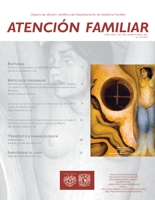Stigma and family support: contributions for therapeutic adhesion of the Acquired Immunodeficiency Syndrome carrier
Main Article Content
Abstract
Objective: to analyze the influence of stigma and family support in therapeutic adhesion of the Acquired Immunodeficiency Syndrome carrier. Material and methods: observational, analytical, cross-sectional study, applied in 42 patients of Human Immunodeficiency Virus (hiv-aids) attending the Family Medicine Unit No. 94 of the Mexican Social Security Institute (imss). Quota sampling was taken under a written consent and under the knowledge of a family member. The intervention was made through a personal interview consisted of the application of questionnaires. It was analyzed the family support perception, family stigma and therapeutic adhesion (Morisky-Green). The analysis was made through a descriptive statistics and the Spearman correlation test. Results: the age range was taken from 22 to 72; the average was 39.3 + 11.3 years. 83% males, 79% single, 36% professional workers, 26% hiv/aids B2 classification, 71% brother’s support. The maximum family support was of 50%, 66.7% without any stigma and 57% with high therapeutic adhesion. Between the family support and family stigma the therapeutic adhesion showed a correlation with r of -.623 and p=0.000. Conclusions: It was corroborated that perception of no minimum stigma and the perception of a maximum family support in the hiv/aids carrier show a high statistical important correlation inversely proportional to their categories in therapeutic adhesion.
